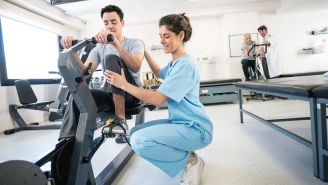The prospect of a heart attack is terrifying, but there’s good news: it’s possible to survive one. “But time is of the essence,” says Frederick Funke, MD, an interventional cardiologist with Trident Medical Center in Charleston, South Carolina. According to Dr. Funke, people who recognize the signs and get to a hospital quickly are more likely to survive-- and less likely to suffer long-term complications.
After you’ve been treated for a heart attack, your healthcare provider will work with you to prevent another, along with taking steps to avoid other heart conditions. “As you get further away from the time of the heart attack, the patient and physician gain more confidence that things are treated adequately,” says Dr. Funke. Here’s what you need to know about recovery, along with life after a heart attack.
Worst-case scenario
A major potential consequence of a heart attack is death, since the heart is no longer working efficiently enough to meet the body’s needs. “The longer the heart goes without oxygen-rich blood, the more likely it is for that part of the heart to essentially die,” Funke says. “Once a part of the heart is permanently damaged, it’s no longer able to contract so the heart becomes less efficient.” Congestive heart failure (CHF) is one possible long-term consequence for heart attack survivors.
Cardiologists frequently say that “time is muscle” when it comes to a heart attack. “The quicker a patient recognizes the signs and symptoms of a heart attack, the less likely he or she is to suffer permanent, irreversible damage to the heart, which is what usually leads to heart failure,” says Funke.
Cardiac rehab
After your heart attack, you may be placed on a program of cardiac rehabilitation. That’s good news for you; a December 2016 study of nearly 5,000 people, published in JAMA Cardiology, found that people in a cardiac rehab program were 41 percent more likely to survive long-term than people who weren’t in a program.
Cardiac rehab is a multi-pronged program, usually consisting of education, exercise, stress reduction and advice on reducing heart disease risk factors. Patients who suffer a heart attack and get a stent or a bypass should be considered for cardiac rehab when they leave the hospital, according to Funke. He notes that it’s usually three times a week for up to 12 weeks, and there’s lots of monitoring.
“There’s a graduated exercise program where patients are monitored by EKG so we can see the heart rhythm,” Funke says. “Blood pressure is monitored as well. Every few weeks the patient is graduated to a more intense exercise regimen. It’s important to condition the heart after a heart attack—the more exercise you do, the stronger your heart gets.”
Lifestyle changes
Even if you’re not put on a cardiac rehab program, your healthcare provider will monitor your recovery, provide education, clear you for exercise (or not) and recommend lifestyle changes to strengthen your heart. Funke says if you’re a smoker you must immediately and permanently quit. “Vaping is not acceptable, except as a bridge to quitting,” he notes.
A proper diet and exercise are both crucial components of heart attack recovery. “Regular exercise gives cardiologists a fuel gauge of the body’s ability to deliver blood to other parts of the body,” says Funke. “There might be another blockage in your arteries that wasn’t fixed during your heart attack treatment and exercise may help reveal it.”
Even light exercise has a significant protective effect. A study of more than 14,000 people published in April 2017 in the European Journal of Preventive Cardiology found that people who engaged in light physical activity were 32 percent more likely to survive a heart attack than sedentary people. For those with a moderate or high level of activity, the benefit was even greater: 47 percent more survived than sedentary people.
Post-hospital struggles
Medication is something many people recovering from a heart attack struggle with, according to Funke. People forget to take their pills, may not be convinced they need medication or fear the side effects. Medication can include aspirin, blood thinners, beta-blockers, nitrates, ACE inhibitors and statins.
“The biggest problem we have is making sure patients understand that their medications are likely going to be needed forever,” Funke says. Your healthcare provider will likely want to see you one to two weeks after you leave the hospital and then on an ongoing basis to make sure you’re taking your meds and you haven’t fallen into old lifestyle habits, says Funke.
Finally, it’s important to realize that depression is common after a heart attack. For many people, a heart attack is a reminder of mortality. “It’s often the first time someone’s been seriously ill. It’s their first brush with what could have been a life-threatening or –ending event,” he says. “People realize they’re getting older, especially when their lifestyle choices haven’t been the best.”
Depressed people may not have the motivation to stick to their medication or keep appointments with their healthcare provider, Funke added. Some research has found that people who are depressed after a heart attack are twice as likely to die over the next decade than people don’t become depressed.
Return to normalcy
On the bright side, most can people return to their daily activities fairly quickly after a heart attack. A lot depends on the severity of the heart attack, your previous lifestyle and whether you’ll be able to make any needed adjustments. You’ll have to watch your diet, take your medication and be cautious about exercise. Depending on the nature of your job, you may be back to work in as little as two weeks. You can start walking right away, and you may be driving within a week, depending on where you live. You can even get back to your normal sex life in a few weeks.






